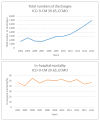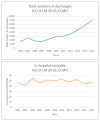Percutaneous Mechanical Circulatory Support Devices in Cardiogenic Shock
- PMID: 28500136
- PMCID: PMC5578718
- DOI: 10.1161/CIRCINTERVENTIONS.116.004337
Percutaneous Mechanical Circulatory Support Devices in Cardiogenic Shock
Abstract
Despite a high rate of early revascularization and use of intra-aortic balloon pump counterpulsation therapy, the prognosis of patients with cardiogenic shock has remained poor. In the hopes of improving outcomes, clinicians are increasingly turning to percutaneous left and right mechanical circulatory support devices. Until recently, the evidence base for these devices had consisted only of observational data, meta-analyses, and small feasibility trials. In this article, we describe the contemporary outcomes of patients with cardiogenic shock, the hemodynamics of cardiogenic shock, and hemodynamic effects of percutaneous mechanical circulatory support devices. We then use this discussion to provide clinicians with a useful framework for understanding when selecting between or while managing patients with a percutaneous mechanical circulatory support devices. We critically review the recently published data for and against the use of commercially available devices-the intra-aortic balloon pump counterpulsation, the Impella system, the TandemHeart, and venous-arterial extracorporeal membrane oxygenation-and highlight gaps in our understanding. Given such gaps, a consensus multidisciplinary approach that combines expertise from interventional cardiologists, heart failure specialists, cardiac surgeons, and cardiac anesthesiologists may help pair the right patient with the right device at the right time.
Keywords: cardiogenic shock; left ventricular dysfunction; mechanical circulatory support; percutaneous; right ventricular dysfunction.
© 2017 American Heart Association, Inc.
Figures




References
-
- Reynolds HR, Hochman JS. Cardiogenic Shock. Current Concepts and Improving Outcomes. 2008;117:686–697. - PubMed
-
- Werdan K, Gielen S, Ebelt H, Hochman JS. Mechanical circulatory support in cardiogenic shock. Eur Heart J. 2014;35:156–67. - PubMed
-
- Gupta N, Aggarwal S, Gaglianello N, Bangalore S, Cinquegrani MP. Abstract 13061: Trends in Incidence, Management and Outcomes of Heart Failure Patients with Cardiogenic Shock. Circulation. 2014;130:A13061–A13061.
-
- Rihal CS, Naidu SS, Givertz MM, Szeto WY, Burke JA, Kapur NK, Kern M, Garratt KN, Goldstein JA, Dimas V, Tu T. 2015 SCAI/ACC/HFSA/STS Clinical Expert Consensus Statement on the Use of Percutaneous Mechanical Circulatory Support Devices in Cardiovascular CareEndorsed by the American Heart Assocation, the Cardiological Society of India, and Sociedad Latino Americana de Cardiologia Intervencion; Affirmation of Value by the Canadian Association of Interventional Cardiology-Association Canadienne de Cardiologie d’intervention*. Journal of the American College of Cardiology. 2015;65:e7–e26. - PubMed
Publication types
MeSH terms
Grants and funding
LinkOut - more resources
Full Text Sources
Other Literature Sources

